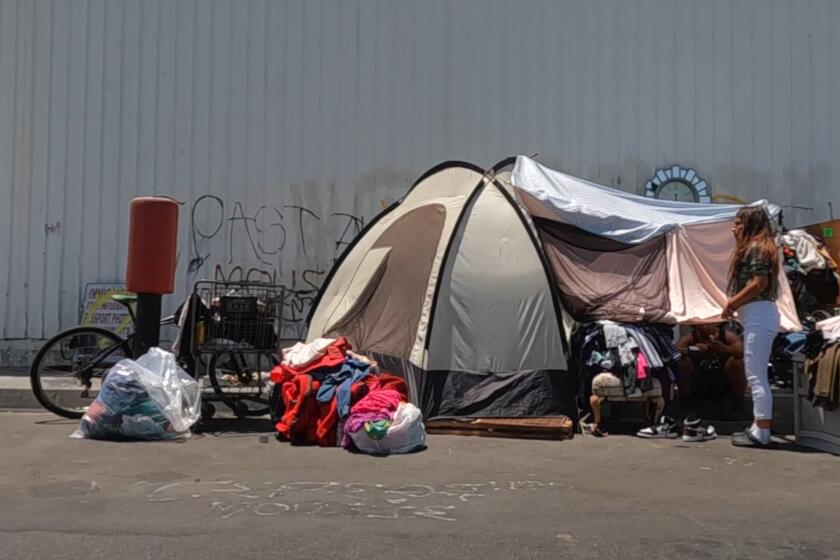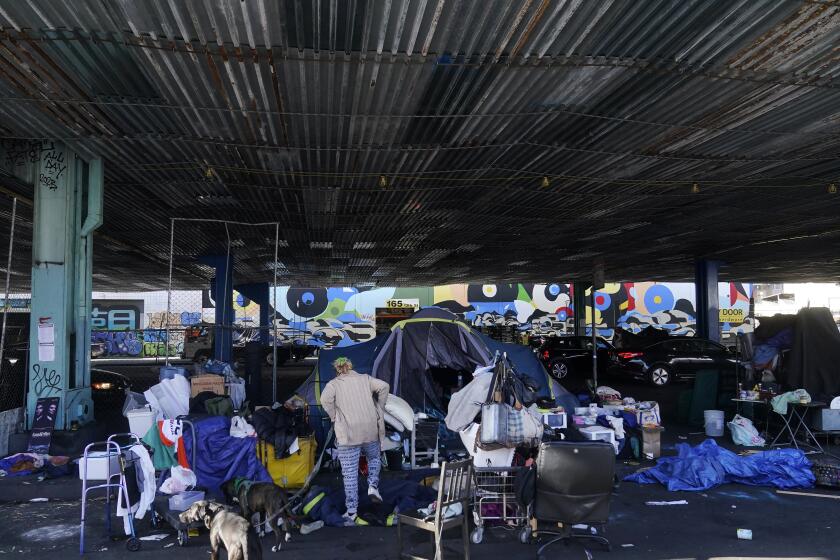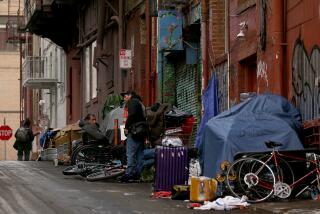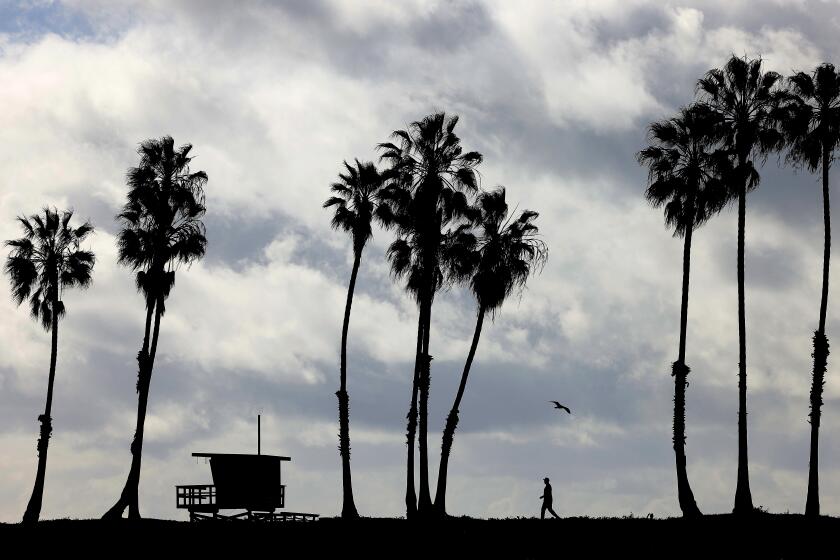California Senate bill seeks to prohibit homeless camps near schools
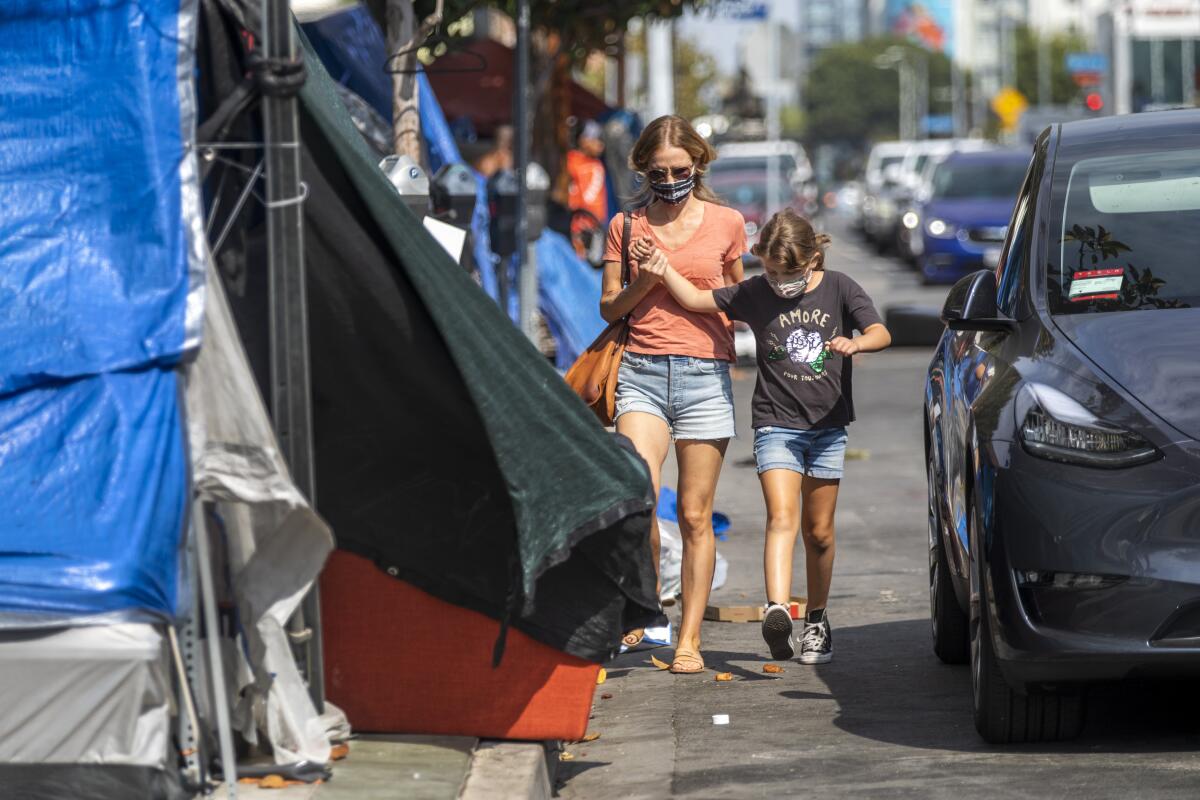
Homeless encampments located 500 feet from “sensitive communities” would be targeted for removal under a new bipartisan California Senate bill modeled on San Diego’s anti-camping law.
State Senate Minority Leader Brian Jones (R-Santee) on Monday introduced Senate Bill No. 1011, which lists Democratic Sen. Catherine Blakespear of Encinitas as a principal co-author. There are also seven Republican senators and eight Assembly members along with two Democratic Senate supporters.
“California has spent $22 billion in the past six years on homelessness and what do we have to show for it?” Jones said at a news conference Tuesday. “Nearly a 40% increase in the homeless population, encampments filling our open spaces and sidewalks with trash, needles and human waste, children being exposed to open drug use and dangerous situations.”
California has spent more than $22 billion over the last four years on combined housing and homelessness initiatives. That includes $10.7 billion allocated from the 2021-22 budget and $7.2 billion from 2022-23.
The Department of Housing and Urban Development released a report in December noting that there were 181,399 unhoused people in California. That number is more than 75,000 ahead of New York (103,200), the next closest state, and dwarfs No. 3 Florida (30,756).
California’s homeless population represents 28% of the entire unhoused community in the nation.
Jones’ legislation proposed to prohibit encampments within 500 feet of schools, open spaces and transit stops in order to protect “vulnerable populations [such as] children, seniors, and families.”
L.A. has a multitude of vacant lots that might be used as temporary, secure places to get people off the streets. Simple enough, right?
SB 1011 would also end sidewalk camping if a homeless shelter is available, which Jones said was vital to open walkways “for travel without unfairly inconveniencing homeless individuals.”
The bill requires a 72-hour warning before an encampment sweep, giving “homeless individuals a chance to find alternatives,” according to Jones.
Enforcement officers will also be required to provide information to affected individuals in regards to sleeping arrangements, and homeless and mental health services.
“Public spaces are not living spaces,” Blakespear said in a statement. “People deserve to live inside, and the public deserve to use their parks, sidewalks and streets as they were designed. This bill is a step toward creating that reality.”
Sen. Rosilicie Ochoa Bogh (R-Yucaipa) said in a statement that SB 1011 struck a balance “between accountability and compassion.”
“By compassionately clearing encampments, we aim to ensure that families can go about their daily lives without having to worry about the dangers posed by homeless individuals with mental health issues, trash, and drug paraphernalia,” she said.
The law was modeled after San Diego’s Unsafe Camping Ordinance, which was passed in June.
More cities across the U.S. are cracking down on homeless tent encampments that have grown more visible and become unsafe.
Those regulations allow the removal of encampments within two blocks of schools, kindergarten through high school, and shelters, along with trolley tracks and transportation hubs, in city parks and waterways.
Los Angeles passed its own controversial encampment ban, dubbed 41.18 for the municipal code section, that riled supporters of the unhoused. The ordinance banned tents from blocking sidewalks and camping within 500 feet of a school, day-care centers, public parks or libraries.
City Controller Kenneth Mejia was one of the ordinance’s biggest detractors and has said the law creates additional trauma for those who live on the streets.
While Jones’ bill is in its infancy, its prospects will likely hinge on a U.S. Supreme Court ruling in a case that could determine whether cities can legally ban or restrict people sleeping on the streets or in other public places.
In the Grants Pass vs. Gloria Johnson case, officials in the Oregon city adopted an ordinance that says: “No person may sleep on public sidewalks, streets, or alleyways at any time as a matter of individual and public safety.” A panel of the San Francisco-based U.S. Court of Appeals for the 9th Circuit later declared the ordinance unconstitutional.
Like Grants Pass, California cities have been the subject of federal lawsuits after passing similar restrictions. Gov. Gavin Newsom filed an amicus brief in September in the Grants Pass case, joining other city, county and state leaders who are looking to limit impediments to removing encampments.
“The courts have tied the hands of state and local governments that seek to use common sense approaches to clean our streets and provide help for unhoused Californians living in inhumane conditions,” Newsom wrote.
More to Read
Start your day right
Sign up for Essential California for news, features and recommendations from the L.A. Times and beyond in your inbox six days a week.
You may occasionally receive promotional content from the Los Angeles Times.
